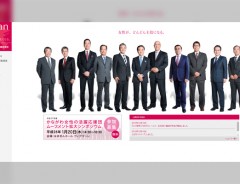
Source: Mai Kana Chan, CC BY-SA 4.0, via Wikimedia Commons
Will the 2020s be a decade of entrepreneurship in Japan?
- Tags:
- Business / entrepreneur / entrepreneurship
Related Article
-

Japanese high school freshman launches startup to cut food waste, opens fruit daifukumochi shop
-

Venture Café: Japan’s Innovation Hub Celebrates 100 Events
-

4th richest person Warren Buffett looks to Japan for a safe investment
-

World’s top startup competition for SDG-minded social entrepreneurs: Japan preliminary round
-

Japanese Initiative To Create Equal Opportunity For Working Women Pictures Only Men In Main Ad
-

Tired of Zoom Happy Hour? Meet virtually at Roppongi bar’s VR outpost awabar.vr on ambr


Japan often looks more like a land of corporate titans than budding entrepreneurs. There are certainly examples of entrepreneurship in the Japanese economy in the 21st century - Uniqlo, Rakuten and Softbank spring to mind. But they are far outnumbered by large, lumbering, longer-established firms.
In the United States, there are 50,000 high-growth small and medium-sized enterprises (i.e., firms that have grown at least 20% per year for three years in a row). There are 16,000 such SMEs in Korea, 13,000 in the UK, and 10,000 in France. In Japan, no-one even knows how many there are because the government does not maintain statistics on SMEs' growth.
This is not good news for the Japanese economy. It is widely recognised that start-ups and SMEs are key to creativity and innovation. Fortunately, reviving Japan's entrepreneurial streak needn't be a pipe dream. Japan used to be the land of entrepreneurship. Indeed, until very recently, the Japanese economy was extremely fluid, with companies coming and going at pace.
The night-time skyline in Akihabara used to be dominated by the billboards of Japan's giant consumer electronics companies, but no longer. | ElHeineken, CC BY 4.0, via Wikimedia Commons
In 1989, half of the 1700 non-financial companies listed on the Tokyo stock exchange were created after WWII. When you look at the 120 largest electronics hardware firms in 1979, you see that nearly half of them had been SMEs in 1955. Among them were companies like Seiko and Sharp, which went on to become today's corporate titans.
Contrary to conventional wisdom, these companies didn’t just mass produce Western technologies. The secret of their success lay in their willingness to gamble on new technologies. They invested huge sums in R&D to produce products that we take for granted today, among them the LCD screen used in digital watches and hand-held calculators, and the C-MOS chip, which was developed by Sharp and later by Toshiba, allowing the company to become a pioneer in mass-market laptops.
Over time, Japan's most successful companies came to dominate the domestic market, and this left little room for start-ups and SMEs. This is to be expected, but somewhere along the way, they also lost their cutting edge. Sadly, that’s true of all sorts of Japanese industries, from chemicals to printing to department stores.
To this day, government policies tend to support incumbents, both large and small, over newcomers. For example, of the financial assistance that the government gives to support R&D, only 10% goes to companies with fewer than 500 employees. This is the lowest level in the OECD. It’s also far harder for newcomers to get bank loans in Japan than it is anywhere else in the OECD.
Start-ups and SMEs are more attractive to talented women. | Lyncconf Games / © Flickr.com
Nonetheless, there are lots of encouraging trends, which, if nurtured by policymakers, could revive Japan’s past entrepreneurial traditions. One of the biggest problems would-be entrepreneurs point to is recruitment, but this has become far easier than it was a couple of decades ago.
People in their 20s and 30s, especially those with IT skills, are more willing to change jobs than their parents' generation was. Start-ups and SMEs are also more attractive to talented women, many of whom are unable to get promoted in traditional companies.
Another factor working to benefit newcomers is e-commerce, which has enabled SMEs to bypass established logistics systems and get direct access to their customers. In 2002, Rakuten was a furniture maker with just $1 million in sales. Thanks to e-commerce, by 2019, it was enjoying $160 million in sales.
If you have a bright idea and are wondering how best to bring it to market in Japan, don't be discouraged. Changes in the labour market, new technologies, and changing attitudes are making it easier than ever to start a new company in Japan. Gambatte-kudasai!
If you're interested to know more about entrepreneurialism in Japan, you might like to watch the Zoominar that Richard Katz, a Senior Fellow at Carnegie Council for Ethics in International Affairs, recently took part in for UC San Diego School of Global Policy and Strategy's Japan Zoominar. The link is here.